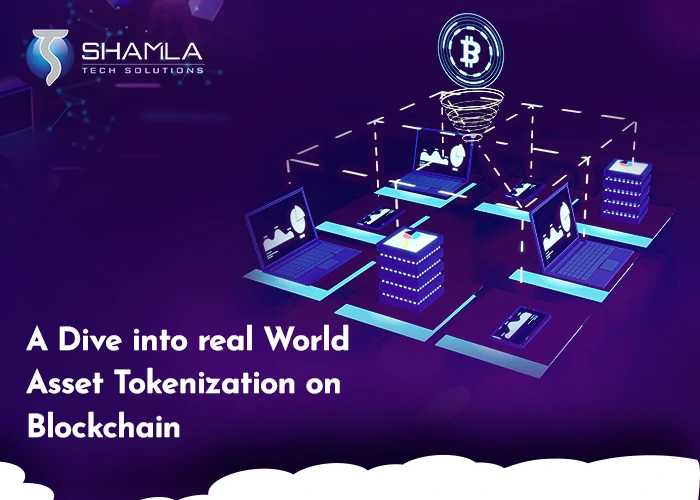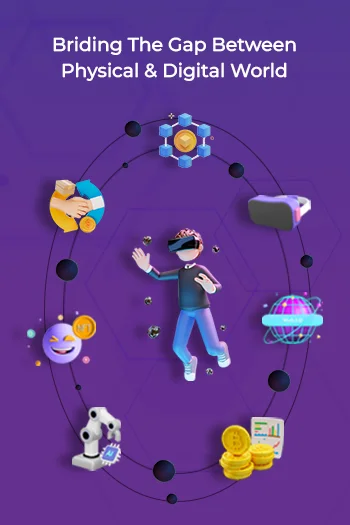Real world Asset Tokenization is revolutionizing the way physical assets are managed and traded by leveraging blockchain technology. This process involves converting tangible assets like real estate, art, or commodities into digital tokens on a blockchain, offering greater liquidity, transparency, and accessibility. An Asset Tokenization company specializes in helping businesses and investors tokenize real-world assets, simplifying transactions and ownership transfers. With Real world Asset Tokenization Development, these companies create secure and compliant frameworks for tokenized asset management. Partnering with a Tokenized asset development company enables seamless integration of blockchain solutions, transforming traditional asset handling into a more efficient and scalable process.
The Process of Asset Tokenization
1. Asset Identification
- Identify the real-world asset to be tokenized, such as real estate, art, or commodities.
- Ensure the asset’s value is verifiable and legally recognized.
- Confirm that the asset can be divided into fractional ownership for easier trading.
- Work with an Asset Tokenization company to assess the asset’s liquidity potential.
- Analyze market demand and investment opportunities for the selected asset.
2. Legal Structuring
- Asset Tokenization companies ensure compliance with relevant regulations.
- Establish legal contracts and frameworks to protect token holders’ rights.
- Use special-purpose vehicles (SPVs) for added security.
- Define the ownership structure and token-holder entitlements.
- Collaborate with legal experts to ensure regulatory requirements are met globally.
3. Token Creation
- Work with a Tokenized Asset Development Company to mint digital tokens representing asset value.
- Divide the asset into smaller, tradable tokens.
- Ensure each token represents a proportional share of the real-world asset.
- Implement security protocols to protect token integrity.
- Prepare for listing tokens on a blockchain network through Real World Asset Tokenization Development.
4. Platform and Blockchain Selection
- Select a blockchain platform based on scalability and security needs.
- Popular choices include Ethereum for its smart contract capabilities.
- Consider transaction fees, speed, and governance structure.
- Ensure the platform supports transparent trading and record-keeping.
- Verify that the platform adheres to the Real World Asset Tokenization standards.
5. Token Offering and Trading
- Offer tokens via Security Token Offerings (STOs) or similar platforms.
- Tokens can be bought, sold, or traded by investors on exchanges.
- Promote liquidity by allowing fractional ownership.
- Provide regular updates on asset value and performance.
- Use Asset Tokenization companies to manage post-tokenization processes and ensure smooth trading
The Benefits of Asset Tokenization
1. Increased Liquidity
One of the primary benefits of Real World Asset Tokenization is the ability to unlock liquidity for traditionally illiquid assets, such as real estate or fine art. Through fractional ownership, smaller investors can participate, and assets can be traded more freely in smaller amounts. Asset Tokenization companies make it easier to buy, sell, and trade these digital tokens on blockchain-based platforms, ensuring continuous market access.
2. Fractional Ownership
Asset Tokenization enables investors to own a fraction of high-value assets that would otherwise be unattainable. For example, investors can buy a portion of a commercial property or a luxury artwork through tokens. This increases participation in the market and opens up new investment opportunities for a wider audience.
3. Improved Transparency
Blockchain technology used in Real World Asset Tokenization Development ensures that every transaction is recorded on an immutable ledger. This creates a transparent and auditable record, allowing all stakeholders to verify ownership and track the asset’s history. Tokenized asset development companies ensure that this transparency minimizes fraud and provides more security to investors.
4. Cost-Efficiency
By eliminating intermediaries such as brokers and legal entities, Real World Asset Tokenization reduces transaction costs significantly. Blockchain smart contracts streamline the buying, selling, and trading processes, which improves overall efficiency. Working with an Asset Tokenization company can simplify this process further, cutting down on paperwork and administrative fees.
5. Global Market Access
With tokenized assets, geographical barriers to investment are removed. Investors from anywhere in the world can participate in the market and access tokenized assets through online platforms. Tokenized asset development companies provide secure and scalable platforms, allowing global access and widening the investor pool.
In summary, Real World Asset Tokenization brings efficiency, liquidity, transparency, and cost-saving advantages, revolutionizing how assets are managed and traded.
How Tokenization is Revolutionizing Real Estate Investments?
Real world Asset Tokenization is transforming the real estate sector by enabling fractional ownership and digital trading of physical properties. Through Asset Tokenization, investors can now purchase portions of high-value assets, such as commercial properties or luxury residences, without needing to buy them outright. This democratizes real estate investments, allowing a broader pool of investors to participate in lucrative markets traditionally reserved for high-net-worth individuals.
An Asset Tokenization company specializes in creating secure, blockchain-based platforms where real estate assets are tokenized. With Real world Asset Tokenization Development, these companies convert physical properties into digital tokens that represent ownership shares. These tokens can then be traded on a blockchain, offering enhanced liquidity compared to traditional real estate transactions, which are often lengthy and complex.
By collaborating with a Tokenized Asset Development Company, real estate businesses and investors gain access to a global market. Investors can buy, sell, and trade tokens representing real estate assets from anywhere in the world, making real estate investment more accessible and efficient. The transparency of blockchain technology also ensures that ownership records and transactions are secure and easily verifiable, minimizing fraud risks.
In summary, Real world Asset Tokenization is reshaping real estate investment by enabling fractional ownership, increasing liquidity, reducing transaction costs, and expanding access to global markets. This revolutionary approach is set to modernize and streamline real estate investments for the future.
How to choose the Right organization for tokenization?
Selecting the right Asset Tokenization company is crucial for the successful execution of Real World Asset Tokenization. Here are key factors to consider when making your decision:
Experience and Expertise
Look for a company with proven experience in Real World Asset Tokenization Development. The company should have a deep understanding of tokenization frameworks, regulatory compliance, and blockchain technology. Companies like Shamlatech stand out due to their extensive expertise in tokenizing real-world assets across various industries.
Security and Compliance
Tokenizing assets involves handling sensitive data and legal agreements, so security is paramount. The right tokenized Asset Development Company will implement cutting-edge blockchain security measures and ensure regulatory compliance. Shamlatech, for example, ensures that all tokenization processes comply with regional and international standards.
Customization and Flexibility
Every business has unique needs. Choose an Asset Tokenization company that offers flexible solutions tailored to your specific asset class, whether it’s real estate, art, or commodities. Shamlatech provides customized tokenization solutions to meet the specific needs of businesses.
Technical Support and Scalability
Tokenization is not a one-time process. The right company should offer ongoing support and scalable solutions that grow with your business. Shamlatech excels in providing robust tokenization platforms that evolve with your business needs.
When selecting a partner for Real World Asset Tokenization Development, focus on experience, security, flexibility, and long-term support. Leading companies like Shamlatech provide all these elements, making them a trusted choice for asset tokenization solutions.
Conclusion
In conclusion, choosing the right Asset Tokenization company is vital for successful Real World Asset Tokenization Development. Key factors include the company’s experience, security protocols, compliance with regulations, and ability to offer customized solutions. Companies like Shamla tech excel in providing comprehensive, secure, and scalable tokenization platforms that meet business-specific needs. With their expertise in Real World Asset Tokenization, Shamla tech ensures a seamless process, from asset digitization to trading, making them a trusted partner in the tokenization space. Their focus on long-term support and flexibility solidifies their position as a top choice for businesses looking to tokenize assets effectively.
FAQs
What is Real World Asset (RWA) Tokenization?
Real World Asset Tokenization is the process of converting physical assets like real estate, commodities, or art into digital tokens on a blockchain. These tokens represent ownership or a share in the asset, enabling fractional ownership and streamlined transactions.
How does RWA Tokenization work?
RWA Tokenization works by issuing digital tokens representing real-world assets on a blockchain. These tokens are backed by the actual asset and can be traded or sold, making it easier to transfer ownership through a decentralized ledger.
What types of assets can be tokenized?
Assets that can be tokenized include real estate, fine art, precious metals, commodities, and even intellectual property. Asset Tokenization companies focus on making these assets available for fractional ownership and easier trading.
What are the benefits of tokenizing real-world assets?
Benefits include increased liquidity, fractional ownership, global accessibility, and cost efficiency. Real World Asset Tokenization Development also enhances transparency and reduces the costs associated with transferring ownership.
Is RWA tokenization legal?
RWA Tokenization is legal in most jurisdictions but depends on regulatory frameworks. Tokenized asset development companies must adhere to the local laws governing securities and asset trading.
What is fractional ownership, and how does it relate to RWA tokenization?
Fractional ownership is a key feature of Real World Asset Tokenization, allowing multiple investors to own parts of a single asset. This enables smaller investors to participate in large-scale investments, such as real estate, by owning tokenized shares of the asset.
How secure is RWA tokenization?
RWA Tokenization is highly secure due to its reliance on blockchain technology. Blockchain’s decentralized nature ensures that records of asset ownership are immutable, transparent, and resistant to fraud. Asset tokenization companies implement additional security measures such as smart contracts to enhance protection.
What are the risks associated with RWA tokenization?
While there are many benefits, there are also risks such as legal uncertainties, regulatory changes, and technological vulnerabilities. As the industry grows, tokenized asset development companies must navigate these challenges to ensure the security and legality of tokenized assets.
How does RWA tokenization impact liquidity?
RWA Tokenization greatly improves liquidity by allowing assets that were traditionally illiquid, like real estate, to be traded easily in smaller fractions. Tokenized assets can be traded on digital exchanges, increasing their marketability and ease of transfer.
What platforms are available for RWA tokenization?
Several blockchain platforms offer solutions for Real World Asset Tokenization, including Ethereum, Polkadot, and specialized platforms developed by asset tokenization companies. These platforms provide the infrastructure needed to create, manage, and trade tokenized assets securely.
What role do smart contracts play in RWA tokenization?
Smart contracts automate the execution of agreements related to tokenized assets, ensuring that ownership transfer and payments occur without the need for intermediaries. They are a crucial part of asset tokenization as they bring transparency and automation to the process.
How does RWA tokenization affect traditional financial markets?
RWA Tokenization is reshaping traditional financial markets by increasing asset accessibility and liquidity. It allows more participants, especially smaller investors, to take part in markets that were previously reserved for large institutions, thereby democratizing investment opportunities.
Can tokenized assets be traded on exchanges?
Yes, tokenized assets can be traded on digital asset exchanges. These exchanges enable buying and selling of fractional shares of real-world assets, providing liquidity and allowing investors to enter and exit positions easily. Many tokenized asset development companies are creating specialized platforms for these trades.
What are the tax implications of RWA tokenization?
The tax implications of RWA tokenization vary by jurisdiction. In some cases, tokenized assets may be subject to capital gains tax, and it is crucial to consult local tax regulations. Asset tokenization companies often provide guidance on tax implications to their clients.
What future trends are expected in RWA tokenization?
Future trends in Real World Asset Tokenization include broader adoption by institutional investors, greater regulatory clarity, and the emergence of more specialized platforms. As more assets are tokenized, the ecosystem is expected to grow, providing increased opportunities for investment and trading.



